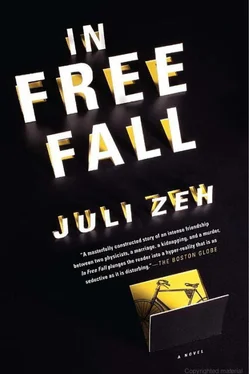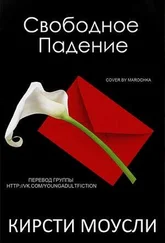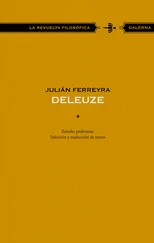“You know it took me ten years to get used to your existence on Bohr’s earth.”
Liam butts in. “What’s Bohr?”
“A great physicist,” Oskar says. “‘The world belongs to those who can explain it.’” He brings his finger to his nose, as if he has to press a button to recover the thread of his thought. When he finds it, he points to Maike. “And if you had to exist, I thought eventually, you could at least look out for him. But what do you do? A pathetically bad job of it. He’s disgracing himself in public.”
Maike lifts her left shoulder in a half shrug, as she does whenever she is at a loss.
“Take a seat,” she says to Sebastian, who has come up to the table. Oskar is looking at her as if he knows a good joke at her expense that he is keeping to himself out of politeness.
Sebastian adjusts a strap on Maike’s dress and smooths the hair on the back of her head before pulling up a chair. When Oskar is there he touches her more often than usual. This irritates him, but he can’t stop himself. Right now, he even wishes that Maike would put down the salad bowl and walk over to the window so that Oskar can see the down on her cheeks lit from behind, and the silhouette of her body beneath the dress. He wants Oskar to see that Maike is a rare creature, a woman to be watched over and to be envied for. He finds these thoughts repellent. Even more abhorrent is the fact that his changed behavior in Oskar’s presence doesn’t disturb Maike in any way. Instead, she raises her eyes in a coquettish fashion, and her voice is half an octave higher than usual.
“Do start.”
Oskar spreads his napkin over his lap, elbows raised as he does so, just as he used to fling his coattails back before he sat down.
“By the way,” Sebastian says, deliberately signaling a change of subject, “my argument with Oskar is on a topic that is extremely current.”
“How nice for you both.” Maike folds salad leaves into tidy parcels with her knife and fork. “Then perhaps there are other people who know what it’s actually all about.”
“I think it’s old news, actually,” Oskar says.
“Not at all,” Sebastian claims. “It’s ultimately about science versus morality. That’s always relevant. Think about that scandal with the doctor.”
“I know nothing about it.”
“Some heart patients bled to death during their operations at the university hospital. Charges were brought. Apparently, unauthorized drugs, which impeded blood coagulation, were being tested on these patients.”
“Oh yes, the Mengele of Freiburg!” Oskar dabs his napkin on his lips after every bite. “Even the proles on the train are talking about it.”
“What’s a Mengele?” asks Liam, who is losing his fight with the salad leaves.
“Let’s not talk about that now,” Maike says quickly.
“Every time you say that, it’s about sex or the Nazis!” Liam crows.
“Don’t be too clever!” Maike says.
Liam throws his fork down immediately. “The Nazis strung steel cables across the streets to cut off the heads of the Americans in jeeps. I saw it on TV!”
“Eat your broccoli,” Sebastian says.
“It’s rocket,” Maike says.
“I don’t think it’s about experimenting on patients,” Sebastian continues, anxious to keep the conversation on track. “The pharmaceutical industry wouldn’t be so bold as to do anything like that, what with the press uproar—”
“Do we have to talk about this?” Maike interrupts.
Oskar lifts his head, astonished. “ Ça va , Maik?”
“Mama knows the murderer!” Liam cries.
“One more word and you’re going straight to bed!”
“You’re talking nonsense, Liam,” Sebastian says. He has not eaten a thing yet, but has already finished his second glass of wine. “Mama knows a senior registrar in Schlüter’s department.” To Oskar he says, “Schlüter is the medical director who is under suspicion. He’s probably going to be suspended. For manslaughter.”
Oskar’s face brightens. “Maik’s cycling friend! The one who works at the hospital. What’s his name again?”
“Ralph,” says Maike.
“Dabbelink,” Sebastian adds, casting a warning glance at Oskar.
If Maike had not been trying so hard to stop herself from blushing, she might have asked herself how Oskar knows about a cycling friend of hers in the first place. Dabbelink had certainly never been mentioned at their previous Friday gatherings.
But he had been mentioned on another occasion, which Maike knew nothing about because she had thought Sebastian was at a conference in Dortmund. Instead, he had been lying under an attic roof on an old sofa, resting on one elbow like a Roman at a feast, gesticulating with his free hand. This Dabbelink fellow, he was saying, was someone who had enough ambition in him to liquefy reinforced concrete. Apart from working crazy hours, he followed a training regime on his bike that took him to the peak of the Schauinsland in the early mornings or the late evenings, depending on his shift. He shaved his arms and legs in order to cut down on air resistance, and when you shook his hand you felt like you were touching a dead man. Sebastian had no idea why Maike had made friends with such a ghastly person, of all the people in her cycling club, and how she could bear to see him two evenings a week. At this point, Oskar’s amused voice interrupted him: Two evenings a week? In tight-fitting cycling gear? With red faces and sweaty hair? Sebastian was at a loss for words.
Now he stands and walks around the table to pour more wine.
“Maike doesn’t like talking about Dabbelink’s involvement in the scandal,” he says. His jokey tone falls flat, as if he has played a note on a badly tuned instrument. He almost crashes into his wife as she stands up, still chewing, to collect the salad plates. The muscles beneath her temples are tensing visibly.
“That’s not funny,” she says. “Ralph is Schlüter’s favorite anesthetist. They get along well in operations and at conferences. Now everyone thinks that Ralph knows something about suspicious contacts with pharmaceutical firms. And that if he talks, the entire hospital will collapse.”
“I see.” Oskar’s eyebrows are raised in sympathy. “Has the poor man been threatened?”
“Yes indeed, he has,” Maike says. “When you try, you can even be quite sensitive.”
She carries the pile of plates to the door, and all is silent until she tells them that they can have a cigarette before the next course. As soon as she leaves, Liam runs into the next room, where there is a plate of biscuits on top of the television. Sebastian watches him through the half-open door, while Oskar sits with his head thrown back, blowing smoke sculptures into the air. For a few minutes, the silence is tender and good.
“What I said before I meant seriously, cher ami ,” Oskar says now. “Our colleagues are laughing about your forays into popular science. If public attention is so important to you…”
Sebastian makes an angry gesture with his hand and Liam, who has come back with crumbs on his lips, thinks it is meant for him. He forces himself onto Oskar’s lap with a cheeky grin.
“Aren’t you getting too old for this now?”
“Not me,” Liam says. “You may be.”
“Do you know,” Oskar says to Liam, “that every time you sneak a biscuit, another world opens up, in which you haven’t stolen one?”
“Parallel universes.” Liam nods. “When Mom asks if I’ve had a biscuit, I always say yes and no. But that doesn’t work with her.”
Oskar starts laughing, and has to wipe his eyes with the backs of his hands. “How right you are!” he says. “If you’ll let me, I’m going to quote you tomorrow evening.”
Читать дальше












